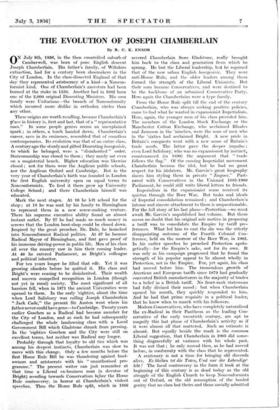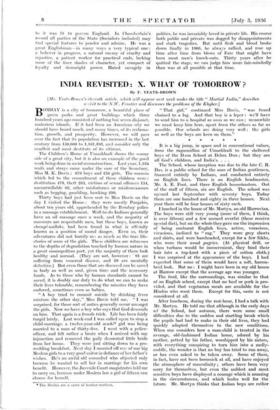THE EVOLUTION OF JOSEPH CHAMBERLAIN
By R. C. K. ENSOR
ON July 8th, 1836, in the then countrified suburb of Camberwell, was born of pure English descent Joseph Chamberlain. His father's family, of Wiltshire extraction, had for a century been shoemakers in the City of London. In the class-dissected England of that day they represented aristocracy of a kind—a Noncon- formist kind. One of Chamberlain's ancestors had been burned at the stake in 1556. Another had in 1662 been one of the 2,000 original Dissenting Ministers. His own family were Unitarians—the branch of Nonconformity which incurred more dislike in orthodox circles than any other.
These origins are worth recalling, because Chamberlain's p`ace in history is, first and last, that of a " representative man." In some people genius seems an unexplained spark ; in others, a torch handed down. Chamberlain's career, save in its eminence, resembled that of countless contemporaries. Its evolution was that of an entire class. A century ago the sturdy and gifted Dissenting bourgeoisie, to which he belonged, were a "disinherited " order. Statesmanship was closed to them ; they rarely sat even on a magisterial bench. Higher education was likewise closed ; not for them were the Anglican public schools, nor the Anglican Oxford and Cambridge. But in the very year of Chamberlain's birth was founded in London the first English university open on equal terms to Nonconformists. To feed it there grew up University College School ; and there Chamberlain himself was educated.
Mark the next stages. At 16 he left school for the shop ; at 18 he was sent by his family to Birmingham to represent them in a new screw-making venture. There his supreme executive ability found an almost instant outlet. By 27 he had made so much money in screws that the London boot-shop could be closed down. inspired by the great preacher, Dr. Dale, he launched into Nonconformist Radical politics. At 37 he became Radical Mayor of Birmingham, and first gave proof of his immense driving-power in public life. Men of his class -all over the country saw in him their coming leader. At 40 he entered Parliament, as Bright's colleague and political inheritor.
For ten years longer he filled that role. Yet it was growing obsolete before he quitted it. His class and Bright's were ceasing to be disinherited. Their wealth and success compelled recognition in London (though not yet in rural) society. The most significant of all 'barriers fell, when in 1871 the ancient Universities were opened to them. In the early 'eighties, about the time when Lord Salisbury was calling Joseph Chamberlain " Jack Cade," the present Sir Austen went where his father never could have gone—to Cambridge. Twenty years earlier Goschen as a Radical had become member for the City of London, and as such he had subsequently challenged the whole landowning class with a Local Government Bill which Gladstone shrank from pressing. In the 'eighties Goschen and the City were still on excellent terms, but neither was Radical any longer.
Probably through that loyalty to old ties which was -among his deepest instincts, Chamberlain was slow to move with this change. Only a few months before the first Home Rule Bill he was thundering against land- owners and aristocrats with his " unauthorised pro- gramme." The present writer can just remember at that time a Liberal ex-business man (a devotee of Bright) recoiling towards Conservatism before the Home Rule controversy, in horror at Chamberlain's violent speeches. Thus the Home Rule split, which in 1886 severed Chamberlain from• Gladstone, really brought him back to the class and generation from which he sprang. He lost the Liberal leadership, but he regained that of the new urban English bourgeoisie. They were anti-Home Rule, and the older leaders among them formed the strength of the Liberal Unionists. But their sons became Conservatives, and were destined to be the backbone of an urbanised Conservative Party. Here again the Chamberlains were a type family.
From the Home Rule split till the end of the century Chamberlain, who was always seeking positive policies, came to find what he wanted in expansionist Imperialism. Here, again, the younger men of his class preceded him. The members of the London Stock Exchange or the Manchester Cotton Exchange, who acclaimed Rhodes and Jameson in the 'nineties, were the sons of men who in the 'sixties had acclaimed Bright. A new pride in Britain's conquests went with a new sense of Britain's trade needs. The latter gave the deeper impulse ; even Lord Salisbury, who was no expansionist by instinct, countenanced (in 1890) the argument that " trade follows the flag." Of the ensuing Imperialist movement Chamberlain became the idol, but he had no great respect for his idolaters. Mr. Garvin's great biography shows him styling them in private " Jingoes." Part- nered with Conservatives in the Unionist 1895-1900 Parliament, he could still write liberal letters to friends.
Imperialism in the expansionist sense received its quietus through the Boer War. But tasks and ideals of Imperial consolidation remained ; and Chamberlain's intense and sincere attachment to them is unquestionable. For the full story of his last phase—Protection—we must await Mr. Garvin's unpublished last volume. But there seems no doubt that his original sole motive in proposing a tariff was to consolidate the Empire by tariff pre- ferences. What led him to cast the die was the utterly disappointing outcome of the Fourth Colonial Con- ference, held on the morrow of the Boer War, in 1902. In his earlier speeches he preached Protection apolo- getically—for the Empire's sake, not for its own. It was only as his campaign progressed that he found the strength of his popular appeal to lie almost wholly in Protection, not in the Empire. For, yet again, his class had moved before him. The tremendous growth of American and European tariffs since 1879 had gradually converted British manufacturers in the majority of trades to a belief in a British tariff. No front-rank 'statesman had fully divined their mood ; but when Chamberlain opened his mouth, they quickly responded to him. And he had that prime requisite in a political leader, that he knew when to march with his followers.
Modem Conservatives, who have completely naturalised the ex-Radical in their Pantheon as the leading Con- servative of the early twentieth century, are apt to magnify this last phase of Chamberlain's activity as if it were almost all that mattered. Such an estimate is absurd. But equally beside the mark is the common Liberal suggestion, that Chamberlain in 1903 did some- thing disgracefully at variance with his whole past. It was not that ; he only moved then, as he had moved before, in conformity with the class that he represented.
A centenary is not a time for bringing old discords alive. Es bleiben tot die Toten, Und nur der Lebendige• lebt ! The fiscal controversy in the form it took at the beginning of this century is as dead today as the old struggle of the English Church to keep Nonconformists out of Oxford, or the old assumption of the landed gentry that no class but theirs and those socially admitted to it was fit to govern England. In Chamberlain's record all parties of the State (Socialists included) may find special features to ponder and admire. He was a great Englishman—in many ways a very typical one : a believer in progress, a natural enemy of cruelty and injustice, a patient worker for practical ends, lacking some of the finer shades of character, yet compact of loyalty and downright power. Hated savagely in politics, he was invariably loved in private life. His course both public and private was dogged by disappointments and stark tragedies. But until flesh and blood broke down finally in 1906, he always rallied, and rose up time after time from blows of Fate that might have been most men's knock-outs. Thirty years after he quitted the stage, we can judge him more fair-mindedly than was at all possible at that time.















































 Previous page
Previous page